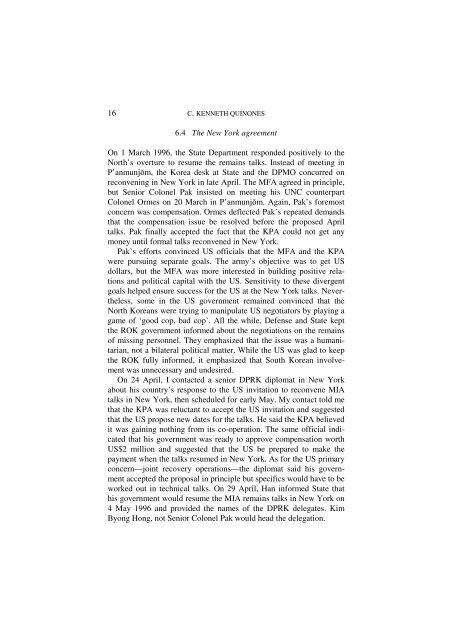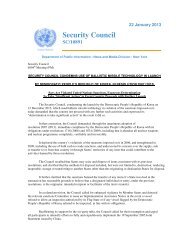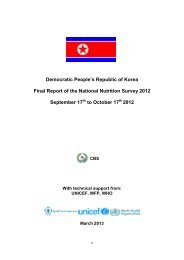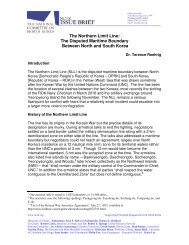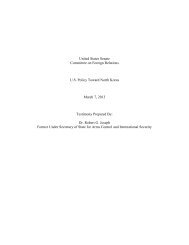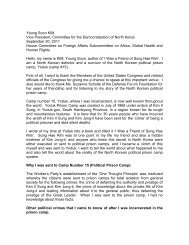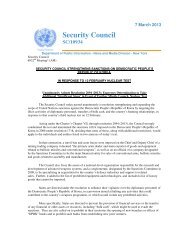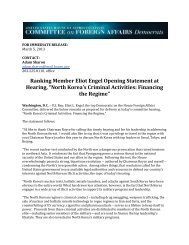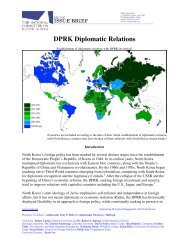Ken Quinones - National Committee on North Korea
Ken Quinones - National Committee on North Korea
Ken Quinones - National Committee on North Korea
You also want an ePaper? Increase the reach of your titles
YUMPU automatically turns print PDFs into web optimized ePapers that Google loves.
16<br />
C. KENNETH QUINONES<br />
6.4 The New York agreement<br />
On 1 March 1996, the State Department resp<strong>on</strong>ded positively to the<br />
<strong>North</strong>’s overture to resume the remains talks. Instead of meeting in<br />
P’anmunjŏm, the <strong>Korea</strong> desk at State and the DPMO c<strong>on</strong>curred <strong>on</strong><br />
rec<strong>on</strong>vening in New York in late April. The MFA agreed in principle,<br />
but Senior Col<strong>on</strong>el Pak insisted <strong>on</strong> meeting his UNC counterpart<br />
Col<strong>on</strong>el Ormes <strong>on</strong> 20 March in P’anmunjŏm. Again, Pak’s foremost<br />
c<strong>on</strong>cern was compensati<strong>on</strong>. Ormes deflected Pak’s repeated demands<br />
that the compensati<strong>on</strong> issue be resolved before the proposed April<br />
talks. Pak finally accepted the fact that the KPA could not get any<br />
m<strong>on</strong>ey until formal talks rec<strong>on</strong>vened in New York.<br />
Pak’s efforts c<strong>on</strong>vinced US officials that the MFA and the KPA<br />
were pursuing separate goals. The army’s objective was to get US<br />
dollars, but the MFA was more interested in building positive relati<strong>on</strong>s<br />
and political capital with the US. Sensitivity to these divergent<br />
goals helped ensure success for the US at the New York talks. Nevertheless,<br />
some in the US government remained c<strong>on</strong>vinced that the<br />
<strong>North</strong> <strong>Korea</strong>ns were trying to manipulate US negotiators by playing a<br />
game of ‘good cop, bad cop’. All the while, Defense and State kept<br />
the ROK government informed about the negotiati<strong>on</strong>s <strong>on</strong> the remains<br />
of missing pers<strong>on</strong>nel. They emphasized that the issue was a humanitarian,<br />
not a bilateral political matter. While the US was glad to keep<br />
the ROK fully informed, it emphasized that South <strong>Korea</strong>n involvement<br />
was unnecessary and undesired.<br />
On 24 April, I c<strong>on</strong>tacted a senior DPRK diplomat in New York<br />
about his country’s resp<strong>on</strong>se to the US invitati<strong>on</strong> to rec<strong>on</strong>vene MIA<br />
talks in New York, then scheduled for early May. My c<strong>on</strong>tact told me<br />
that the KPA was reluctant to accept the US invitati<strong>on</strong> and suggested<br />
that the US propose new dates for the talks. He said the KPA believed<br />
it was gaining nothing from its co-operati<strong>on</strong>. The same official indicated<br />
that his government was ready to approve compensati<strong>on</strong> worth<br />
US$2 milli<strong>on</strong> and suggested that the US be prepared to make the<br />
payment when the talks resumed in New York. As for the US primary<br />
c<strong>on</strong>cern—joint recovery operati<strong>on</strong>s—the diplomat said his government<br />
accepted the proposal in principle but specifics would have to be<br />
worked out in technical talks. On 29 April, Han informed State that<br />
his government would resume the MIA remains talks in New York <strong>on</strong><br />
4 May 1996 and provided the names of the DPRK delegates. Kim<br />
By<strong>on</strong>g H<strong>on</strong>g, not Senior Col<strong>on</strong>el Pak would head the delegati<strong>on</strong>.


